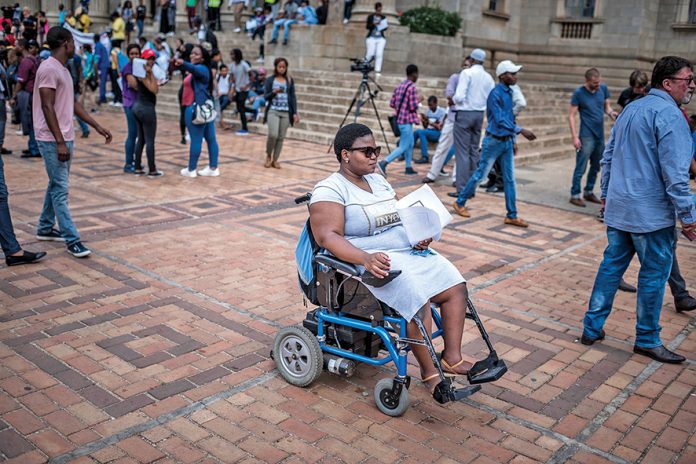Advocacy and rights groups for students with disabilities have painted a dismal picture of the work done at universities to ensure that teaching and learning, infrastructure development, support services and extra-curricular activities do not exclude those with disabilities.
Luigia Nicholas, who manages the portfolio of special needs at Stellenbosch University’s student representative council, and is also the chairperson of the South African Union of Students (Saus) subcommittee on disability, shed some light on the problems faced by students with disabilities.
She said their plight included not being granted additional time to write; not being granted permission for oral exams; lack of access or delayed access to information, if it reaches them; financial challenges that limit those who want to study, while those already enrolled suffer when payment is delayed and caregivers are not paid.
The challenges are highlighted in a document titled “Welfare of Students with Disabilities”, which was compiled by the Saus after meeting students with disabilities from across the country’s 26 public institutions, and further talks with representatives in student council bodies.
Students have also noted exclusion in the form of the mediums of teaching, learning and communication used, which do not cater for the hearing or
visually impaired; transportation that does not consider wheelchair users; social events that do not encourage the participation of students with disabilities; and sexual health information that does not take them into consideration.
Martie Miranda, the chairperson of the Higher and Further Education Institutions in South Africa (Hedsa), has attributed the slow progress in transforming universities to be inclusive centres for all to the fact the guidelines contained in the “Strategic Policy Framework on Disability for the Post-School Education and Training System” developed in 2018 by the Department of Higher Education and Training (DHET), has been relegated to disability units at universities.
She told the first meeting of the year of Universities South Africa’s Transformation Managers Forum (TMF) that Hedsa has observed that at many varsities the transformation policy does not have the support from the offices of vice-chancellors.
She bemoaned the fact the policy is not being taken seriously by decision-makers at universities, thereby relegating it to the responsibility of units for students with disabilities.
Nicholas said that funding is a major problem. “The DHET has developed a new strategic policy framework, which has more guidelines for universities to follow but the problem still remains the lack of funding for infrastructure to be improved at universities,” she said.
The TMF has committed to working with Hedsa as part of its priorities for 2022, which is a “review of universal access and disability support in higher education, placing people with disabilities at the centre”.



